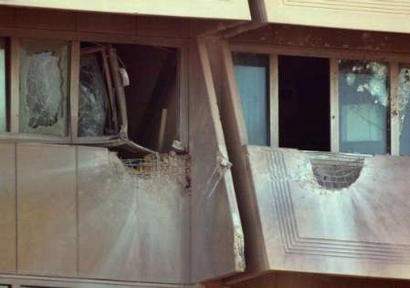
alrashid.jpg, image/jpeg, 410x288
Iraqi guerrillas fired rockets at downtown Baghdad's Al Rasheed Hotel, now a headquarters for occupation authorites. Fifteen people were wounded, including U.S. military personnel and civilians working for the "coalition." One person was killed, an American Colonel for the U.S. Army... the highest ranking soldier to have died in Iraq to date. Hey George... where are those Iraqi weapons of mass destruction you launched this war over?

alrashid.jpg, image/jpeg, 410x288
Oct. 26, 2003.
Baghdad rocket attack targets U.S. heart
Paul Wolfowitz, one of the war's architects, unhurt in strike
CHARLES J. HANLEY
ASSOCIATED PRESS
BAGHDAD - Anti-American forces struck at the heart of the U.S. occupation today, battering the Al Rasheed Hotel with a rocket barrage that killed one U.S. soldier, wounded 15 other people and sent scores of American officials fleeing their beds for safety, including the visiting deputy defence secretary. The dead American was a colonel.
The shaken-looking but unhurt Pentagon deputy, Paul Wolfowitz, said afterwards that the attack "will not deter us from completing our mission" in Iraq.
But the bold strike from nearly point-blank range once again pointed up the vulnerability of even heavily guarded U.S. facilities in Iraq, where American forces sustain an average of 26 lower-profile attacks daily, and where Wolfowitz had come to assess ways to defeat a stubborn six-month-old insurgency.
A day earlier, attackers firing rocket-propelled grenades had forced down a U.S. army helicopter north of Baghdad just hours after Wolfowitz left that area on the second day of a three-day visit. One soldier was injured.
The modern, 462-room Al Rasheed houses officials of the U.S.-led occupation office — the Coalition Provisional Authority — and U.S. military personnel. The 6:10 a.m. attack, awakening people across central Baghdad, left the concrete western face of the 18-storey building pockmarked with a half-dozen or more blast holes. Windows were shattered in at least two dozen rooms. Torn drapes dangled out over sills.
The U.S. command said the 15 wounded included seven American civilians, four U.S. military personnel and four non-U.S. civilians working for the coalition. The command did not immediately identify the dead American, but in a transcript of remarks to a limited audience, Wolfowitz referred to the victims of the attack, ``including a colonel who tragically died." The transcript was released by the Pentagon, but the colonel's name was not published.
Iraqi police said the attacker or attackers, in a white Chevrolet pickup, had boldly driven to the edge of the city's main Zawra Park and Zoo, just 500 metres southwest of the hotel, towing what looked like a portable, two-wheeled generator or compressor. A police commander, who spoke on condition that he not be named, said that when security guards approached, the assailants drove off, but rockets within the blue trailer apparently had been set to fire via a timer and suddenly ignited, flashing toward the hotel, a clear shot looming just over the treetops.
"When he saw us, he fled," guard Jabbar Tarek said of the driver. The guards weren't armed, Tarek said, or "I would have fired on him." Tarek and two other guards were lightly injured by the ignition blast, police said. Closer to the Al Rasheed, Iraqi security guard Dafer Jawad, 28, saw projectiles flying toward the hotel. "There was a whooshing sound," he said. The blasts shook houses and rattled windows a kilometre and a half away. "I thought my house was being destroyed, it was such a huge sound," said Hamoudi Mutlag, 48, an Al Rashid maintenance worker who resides between the firing point and the hotel. Asked whether he now feared staying in his house, he replied, "Every place in Baghdad is dangerous now that the Americans are here."
The damage was concentrated between the second and eighth floors in the northwest quarter of the hotel. "After awhile, people were rushing across from the hotel into the convention centre, some of them in pyjamas or shorts," said Jawad. "There is no guarantee we can protect against this kind of thing unless we have soldiers on every block," said Lt. Brian Dowd, a U.S. reconnaissance officer at the scene.
Later in the morning, U.S. soldiers were seen removing what appeared to be at least two remaining rockets, perhaps one metre long, from the abandoned trailer, and then towing the vehicle off.
The formerly government-owned Al Rasheed, Baghdad's best-known luxury hotel, was taken over by occupation authorities after U.S.-British forces toppled the Baathist government of Saddam Hussein last April. The hotel is situated just within the "Green Zone," a heavily guarded district bordering the Tigris River that includes the palace headquarters of the U.S.-led CPA, the offices of the interim Iraqi Governing Council and a convention centre that houses coalition press-relations and other offices.
The well-planned attack was the second on the hotel, which was hit Sept. 27 by small rockets or rocket-propelled grenades that caused minimal damage and no casualties.
Original: U.S. Colonel killed in Baghdad Al Rashid rocket attack